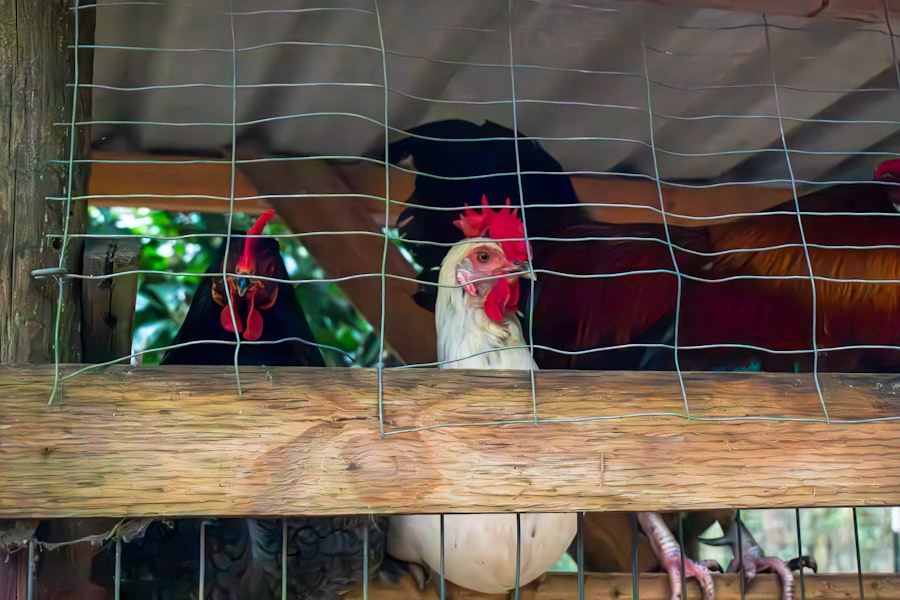Chickens are naturally curious and social animals with a strong instinct to forage for food. This behavior can lead them to explore areas of your property where they may not be welcome, such as gardens or flower beds. Understanding chicken behavior is crucial for finding effective ways to keep them out of these areas.
Chickens are easily startled, with sudden movements or loud noises causing them to flee. They also have a strong sense of hierarchy within their flock, and may be more likely to venture into off-limits areas if they see other chickens doing so. Chickens are persistent and determined when searching for food, often scratching and pecking at the ground for hours to find insects, seeds, and other edible items.
This behavior can cause damage to landscaping and gardens. As opportunistic feeders, chickens will take advantage of any food source they encounter, even if it is not intended for them. Understanding these behaviors helps in anticipating where chickens may be drawn to on your property and allows for proactive measures to deter them from these areas.
Table of Contents
- 1 Creating Physical Barriers
- 2 Using Natural Deterrents
- 3 Implementing Repellents
- 4 Providing Alternative Distractions
- 5 Training and Supervising Chickens
- 6 Seeking Professional Assistance
- 7 FAQs
- 7.1 What are some natural ways to keep chickens away from plants?
- 7.2 Are there any commercial products available to keep chickens away from plants?
- 7.3 What are some plants that chickens tend to avoid?
- 7.4 How can I train my chickens to stay away from certain areas of my garden?
- 7.5 Are there any plants that are toxic to chickens that I should be aware of?
Key Takeaways
- Chickens are naturally curious and will explore their surroundings, so understanding their behavior is key to preventing them from causing damage.
- Creating physical barriers such as fences and netting can effectively keep chickens away from certain areas or plants.
- Using natural deterrents like predator decoys, reflective objects, or strong-smelling plants can help keep chickens at bay.
- Implementing repellents such as sprays or powders can discourage chickens from damaging specific areas or plants.
- Providing alternative distractions like designated scratching areas or hanging treats can redirect chickens’ attention away from destructive behavior.
- Training and supervising chickens can help reinforce boundaries and discourage destructive behavior.
- Seeking professional assistance from a veterinarian or animal behaviorist may be necessary for persistent or severe chicken behavior issues.
Creating Physical Barriers
Physical Barriers: A Simple Solution
One effective way to keep chickens out of certain areas of your property is to create physical barriers that prevent them from accessing those areas. This can include installing fences or netting around your garden or flower beds to keep chickens from scratching and pecking at the soil. It’s important to make sure that the barriers are secure and tall enough to prevent the chickens from flying over or squeezing through.
Protecting Your Garden
Using chicken wire or hardware cloth to cover the soil in your garden can prevent chickens from digging up plants and disturbing the soil. Another physical barrier that can be effective in deterring chickens is the use of motion-activated sprinklers. These devices are designed to detect movement and then spray a burst of water, startling the chickens and causing them to flee.
Containing Your Chickens
Using physical barriers such as chicken coops or enclosures can help keep your chickens contained in designated areas of your property, preventing them from wandering into off-limits areas. This can be an effective way to keep chickens out of specific areas without causing them harm.
Using Natural Deterrents

In addition to physical barriers, there are also natural deterrents that can be used to keep chickens away from certain areas of your property. One effective natural deterrent is the use of predator decoys, such as fake owls or hawks. Chickens are naturally wary of predators, and the sight of a predator decoy can cause them to avoid the area altogether.
It’s important to move the decoys around periodically to prevent the chickens from becoming accustomed to them. Another natural deterrent that can be effective in keeping chickens away is the use of strong-smelling plants or herbs. Chickens have a keen sense of smell, and certain scents can be off-putting to them.
Planting herbs such as lavender, mint, or rosemary around your garden or flower beds can help deter chickens from venturing into those areas. Additionally, spreading citrus peels or coffee grounds around the perimeter of your garden can also help keep chickens at bay.
Implementing Repellents
In addition to physical barriers and natural deterrents, there are also commercial repellents that can be used to keep chickens away from specific areas of your property. These repellents are typically formulated with strong-smelling or bitter-tasting ingredients that are unpleasant to chickens. They can be sprayed directly onto plants or surfaces that you want to protect, creating a deterrent that will discourage chickens from approaching those areas.
One common type of commercial repellent is made with capsaicin, the compound that gives chili peppers their heat. Spraying this type of repellent on plants can make them unappealing to chickens, as they will avoid eating anything that tastes spicy. Another type of commercial repellent is made with bitter-tasting ingredients such as denatonium benzoate, which can be sprayed on surfaces to deter chickens from pecking at them.
Providing Alternative Distractions
One way to keep chickens out of off-limits areas is to provide them with alternative distractions that will keep them occupied elsewhere on your property. This can include setting up designated foraging areas with plenty of space for scratching and pecking, as well as providing toys and enrichment activities to keep them mentally stimulated. By providing chickens with plenty of opportunities for natural behaviors such as foraging and exploring, you can help prevent them from seeking out these activities in areas where they are not welcome.
Another way to provide alternative distractions for chickens is to offer them a variety of treats and snacks in designated feeding areas. This can include scattering scratch grains or mealworms in specific locations on your property to encourage the chickens to spend their time there instead of in off-limits areas. Additionally, providing hanging feeders or treat dispensers can keep chickens occupied and prevent them from venturing into areas where they may cause damage.
Training and Supervising Chickens

Intelligent Animals Require Training
Chickens are intelligent animals that can be taught to respond to cues and commands. By using positive reinforcement training techniques, you can teach your chickens to avoid certain areas of your property and to respond to cues that indicate where they are allowed to go.
Supervise to Prevent Unwanted Behavior
Supervising your chickens when they are free-ranging on your property can also help prevent unwanted behavior. By keeping an eye on your chickens and intervening if they start to venture into off-limits areas, you can help reinforce boundaries and prevent damage to your landscaping and gardens.
Observe and Identify Patterns
Additionally, supervising your chickens allows you to observe their behavior and identify any patterns or triggers that may be leading them to explore certain areas. This can help you take proactive steps to prevent unwanted behavior and keep your property safe.
Seeking Professional Assistance
If you are struggling to keep chickens out of certain areas of your property, it may be helpful to seek professional assistance. A local poultry expert or animal behaviorist may be able to provide personalized advice and guidance on how to address the specific challenges you are facing with your chickens. They can help you develop a comprehensive plan for managing chicken behavior on your property and may be able to offer additional resources and support.
In some cases, it may also be beneficial to consult with a professional pest control service that specializes in managing wildlife on residential properties. These professionals can assess the situation and recommend targeted strategies for deterring chickens from specific areas of your property without causing harm to the animals. By seeking professional assistance, you can gain access to expert knowledge and resources that can help you effectively manage chicken behavior on your property.
In conclusion, understanding the behavior of chickens is essential for finding effective ways to keep them out of off-limits areas on your property. By creating physical barriers, using natural deterrents, implementing repellents, providing alternative distractions, training and supervising chickens, and seeking professional assistance when needed, you can effectively manage chicken behavior and prevent damage to your landscaping and gardens. With a proactive approach and a combination of strategies, you can create a harmonious coexistence with your feathered friends while protecting your property from unwanted chicken activity.
If you’re looking for more tips on keeping chickens, you might be interested in this article on how to insulate a chicken coop. Insulating your coop can help keep your chickens comfortable and healthy, and it may also help keep them from wandering into your garden and eating your plants.
FAQs
What are some natural ways to keep chickens away from plants?
Some natural ways to keep chickens away from plants include using physical barriers such as fences or netting, planting deterrent plants like marigolds or lavender, and using natural repellents like citrus peels or garlic spray.
Are there any commercial products available to keep chickens away from plants?
Yes, there are commercial products available such as chicken wire cloches, motion-activated sprinklers, and chicken repellent sprays that can help keep chickens away from plants.
What are some plants that chickens tend to avoid?
Chickens tend to avoid plants with strong scents or prickly textures, such as lavender, rosemary, marigolds, and thorny bushes like blackberry or raspberry bushes.
How can I train my chickens to stay away from certain areas of my garden?
You can train your chickens to stay away from certain areas of your garden by using positive reinforcement, such as providing treats in a designated area away from the plants you want to protect, and using deterrents like loud noises or water sprays when they approach the protected plants.
Are there any plants that are toxic to chickens that I should be aware of?
Yes, there are several plants that are toxic to chickens, including azaleas, rhododendrons, nightshade plants, and daffodils. It’s important to research and avoid planting these toxic plants in areas accessible to your chickens.
Meet Walter, the feathered-friend fanatic of Florida! Nestled in the sunshine state, Walter struts through life with his feathered companions, clucking his way to happiness. With a coop that’s fancier than a five-star hotel, he’s the Don Juan of the chicken world. When he’s not teaching his hens to do the cha-cha, you’ll find him in a heated debate with his prized rooster, Sir Clucks-a-Lot. Walter’s poultry passion is no yolk; he’s the sunny-side-up guy you never knew you needed in your flock of friends!







